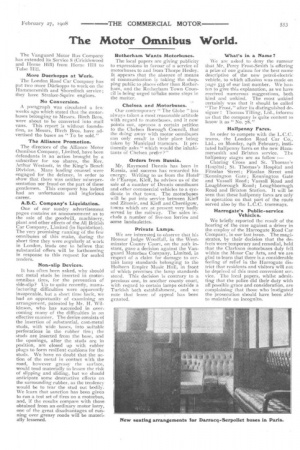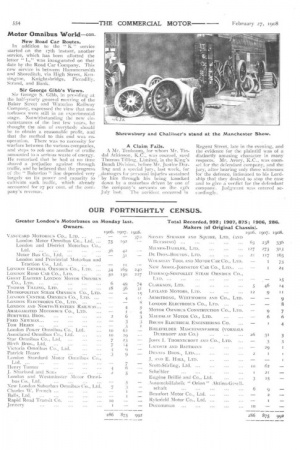The Motor Omnibus World.
Page 9

Page 10

If you've noticed an error in this article please click here to report it so we can fix it.
The Vanguard Motor Bus Company has extended its Service 8 (Cricklewood and Herne Hill) from Herne Hill to Tulse Hill.
More Duerkopps at Work.
The London Road Car Company has put two more Diirkopps to work on the Hammersmith and Shoreditch service; they have Straker-Squire engines.
No Conversion.
A paragraph was circulated a few weeks ago which stated that the motorbuses belonging to Messrs. Birch Bros. were about to be converted into mail vans. This report is without foundation, as Messrs. Birch Bros. have advertised the buses as " To be sold."
The Alliance Promotion.
The directors of the Alliance Motor Omnibus Company, Limited, have been defendants in an action brought by a subscriber for too shares, the Rev. Arthur Westcott, in the King's Bench Division. Many leading counsel were engaged for the defence, in order to show that there was neither misrepresentation nor fraud on the part of these gentlemen. This company has indeed had an unfortunate and inglorious career.
A.B.C. Company's Liquidation.
One of our sundry advertisement pages contains an announcement as to the sale of the goodwill, machinery, plant and other effects of the All British Car Company, Limited (in liquidation). The very promising running of the few omnibuses of this make, during the short time they were regularly at work in London, leads one to believe that substantial offers will be forthcoming in response to this request for sealed tenders.
Non.-slip Devices.
It has often been asked, why should not metal studs be inserted in motoromnibus tires, for the prevention of side-slip? Up to quite recently, manufacturing difficulties were apparently insuperable, but a short time back, we had an opportunity of examining an arrangement, patented by Mr. H. Wilkinson, who has succeeded in overcoming many of the difficulties in an effective manner. The device consists of the insertion of substantial, cast-metal studs, with wide bases, into suitable perforations in the rubber tire ; the studs are inserted from the base, and the openings, after the studs are in position, are closed up with rubber plugs to form resilient cushions for the studs. We have no doubt that the action of the metal in contact with the road, however greasy the surface, would tend materially to lessen the risk of slipping and sliding, but we should anticipate some destructive effects on the surrounding rubber, as the tendency would be to tear the stud out bodily. We learn that sanction has been given to run a test set of tires on a motorbus, and, if the results compare with those obtained from an ordinary motor lorry, one of the great disadvantages of running over greasy roads will be materially lessened. Rotherham Wants Motorbuses.
The local papers are giving publicity to expressions in favour of a service of motorbuses to and from Thorpe Hesley. It appears that the absence of means of communication is taking the shopping public to places other than Rotherham, and the Rotherham Town Council is being urged tAake some steps in the matter.
Chelsea and Motorbuses.
Our con tenporary " The Globe " has always taken a most reasonable attitude with regard to motorbuses, and it now points out, apropos a certain petition to the Chelsea Borough Council, that the doing away with motor omnibuses can only result in their place being taken by Municipal tramcars. It pertinently asks " which would the inhabitants of Chelsea prefer?"
Orders from Russia.
Mr. Raymond Dennis has been in Russia, and success has rewarded his energy. Writing to us from the Hotel' de l'Europe, Kieff, he advises us of the sale of a number of Dennis omnibuses and other commercial vehicles to a syndicate in that town. The motorbuses will be put into service between Kieft and Zitomir, and Kieff and Chennigow, towns which are at present very badly served by the railway. The sales include a number of five-ton lorries and some landaulettes.
Private Lamps.
We are interested to observe that his Honour Judge Woodfall, in the Westminster County Court, on the 20th instant, gave a decision against the Vanguard Motorbus Company, Limited, in respect of a claim for damage to certain lamp standards belonging to the Holborn Empire Music Hall, in front of which premises the lamp standards stood. This decision is contrary to a previous one, in another county court, with regard to certain lamps outside a Turkish bath establishment, and we note that leave of appeal has been granted.
What's in a Name ?
We are asked to deny the rumour that Mr. Percy Frost-Smith is offering a prize of one guinea for the best name descriptive of the new petrol-electric vehicle, to which allusion was made on page 535 of our last number. We hasten to give this explanation, as we have received numerous suggestions, both kind and unkind. The most unkind certainly was that it should be called "The Frost," after its distinguished designer I Thomas Tilling, Ltd., informs us that the company is quite content to know it as " No. 78."
Halfpenny Fares.
In order to compete with the L.C.C. trams, the London Road Car Co., Ltd., on Monday, 24th February, instituted halfpenny fares on the new Hammersmith and Brixton service. The halfpenny stages are as follow :— Charing Cross and St. Thomas's Hospital ; St, Thomas's Hospital and Fitialan Street; Fitzalan Street and Kennington Gate ; Kennington Gate and Vassall Road; Vassal]. Road and Loughborough Road; Loughborough Road and Brixton Station, It will be seen that these halfpenny fares are only in operation on that part of the route served also by the L.C.C. tramways.
Harrogate's Public-service Vehicle s.
We briefly reported the result of the hearing of the case against a driver in the employ of the Harrogate Road Car Company, in our last issue. The magistrates, by their decision that the defects were temporary and remedial, held that the Clarkson motorbuses duly fell within the Motor Car Acts, and we are glad to learn that there is a considerable feeling of relief in the Harrogate district that residents and visitors will not be deprived of this most convenient service. The local papers, whilst admitting that the police did their duty with all possible grace and consideration, are complaining that those who instigated the prosecution should have been able to-maintain an incognito.
New Road Car Routes.
In addition to the " K " service started on the 17th instant, another service, which has been allotted the letter " L," was inaugurated on that date by the Road Car Company. This new service is between Hammersmith and Shorediteh, via High Street, Ken-sington, Knightsbridge, Piccadilly, Strand, and Bank.
Sir George Gibb's Views.
Sir George S. Gibb, in presiding at the half-yearly general meeting of the Baker Street and Waterloo Railway Company, expressed the view that motorbuses were still in an experimental stage. Notwithstanding the new ciremnstances of the last few years, he thought the aim of everybody should be to obtain a reasonable profit, and that the method to this end was cooperation. There was no necessity for warfare between the various companies, and steps to rob one another of traffic amounted to a serious waste of energy. He remarked that he had at no time shared a prejudice against through traffic, and he believed that the progress of the " Bakerloo " line depended very largely on its power and capacity to cultivate such traffic, which already accounted for 27 per cent, of the Company's revenue. A Mr. Tenbaum, for whom Mr. Tindal Atkinson, K.C;, was counsel, sued Thomas Tilling, Limited, in the King's Bench Division, before Mr. Justice Darling and a special jury, last week, for ,„damages for personal injuries sustained by him through his being knocked down by a motorbus driven by one of the company's servants on the 13th July last. The accident occurred in Regent Street, late in the evening, and the evidence for the plaintiff was of a distinctly amusing character in many respects. Mr. Avory, K.C., was counsel for the defendant company, and the jury, after hearing only three witnesses for the defence, intimated to his Lordship that they desired to stop the case and to give a verdict for the defendant company. Judgment was entered accordingly.




























